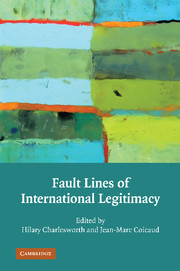Book contents
- Frontmatter
- Contents
- Acknowledgments
- Contributors
- Introduction
- PART I FROM THE HISTORY AND STRUCTURE OF INTERNATIONAL LEGITIMACY TO FAULT LINES IN CONTEMPORARY INTERNATIONAL POLITICS
- 1 Legitimacy, Across Borders and Over Time
- 2 Deconstructing International Legitimacy
- 3 The Evolution of International Order and Fault Lines of International Legitimacy
- 4 Intervention in a “Divided World”: Axes of Legitimacy
- 5 From Berlin to Bonn to Baghdad: A Space for Infinite Justice
- PART II THE UN SECURITY COUNCIL: EXPRESSION, VENUE, AND PROMOTER OF INTERNATIONAL LEGITIMACY?
- PART III LEGITIMACY OF INTERNATIONAL INTERVENTIONS AND HIERARCHY OF INTERNATIONAL RIGHTS
- PART IV IN SEARCH OF NEW FORMS OF INTERNATIONAL LEGITIMACY: BETWEEN POWER AND PRINCIPLES
- Conclusion: The Legitimacies of International Law
- Index
- References
2 - Deconstructing International Legitimacy
Published online by Cambridge University Press: 06 April 2010
- Frontmatter
- Contents
- Acknowledgments
- Contributors
- Introduction
- PART I FROM THE HISTORY AND STRUCTURE OF INTERNATIONAL LEGITIMACY TO FAULT LINES IN CONTEMPORARY INTERNATIONAL POLITICS
- 1 Legitimacy, Across Borders and Over Time
- 2 Deconstructing International Legitimacy
- 3 The Evolution of International Order and Fault Lines of International Legitimacy
- 4 Intervention in a “Divided World”: Axes of Legitimacy
- 5 From Berlin to Bonn to Baghdad: A Space for Infinite Justice
- PART II THE UN SECURITY COUNCIL: EXPRESSION, VENUE, AND PROMOTER OF INTERNATIONAL LEGITIMACY?
- PART III LEGITIMACY OF INTERNATIONAL INTERVENTIONS AND HIERARCHY OF INTERNATIONAL RIGHTS
- PART IV IN SEARCH OF NEW FORMS OF INTERNATIONAL LEGITIMACY: BETWEEN POWER AND PRINCIPLES
- Conclusion: The Legitimacies of International Law
- Index
- References
Summary
As alluded to in the Introduction and Chapter 1, the post–Cold War era underscored the importance of international legitimacy. Once the danger of Armageddon associated with the East–West confrontation had been removed, initially there was less visceral need – at least, among winners – to pursue security at all costs, whatever the means. Giving greater attention to right (i.e., legitimacy) and not simply might, as well as recognition to the overall benefits that international cooperation and socialization embedded in legitimacy would bring to interstate politics, seemed the best option. The window of opportunity that this created for human rights and democratic values to increasingly shape policies could only contribute to enhancing the visibility and relevance of legitimacy, as it called for more accountability. Tragically, the conflicts that marked the post–Cold War period offered their own openings. By triggering the establishment of international criminal tribunals, the massive human-rights violations and humanitarian crises accompanying wars in collapsing countries sent the message that basic requirements of legitimacy would not be denied with impunity. Here, particularly in the 1990s, the sympathetic coverage provided by global media and the involvement of world society (especially nongovernmental organizations [NGOs]) in support of civilian victims of conflicts played a positive role. In addition, globalization highlighted international legitimacy. Indeed, whereas it was perceived as affecting millions of people, it was often also seen as affecting them negatively, and many argued that this was happening with the collaboration of international institutions.
- Type
- Chapter
- Information
- Fault Lines of International Legitimacy , pp. 29 - 86Publisher: Cambridge University PressPrint publication year: 2010
References
- 1
- Cited by

